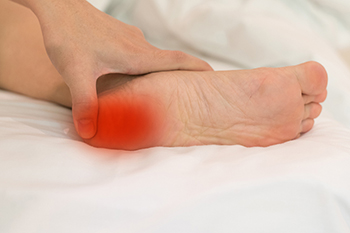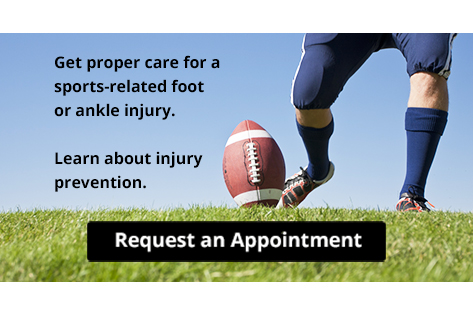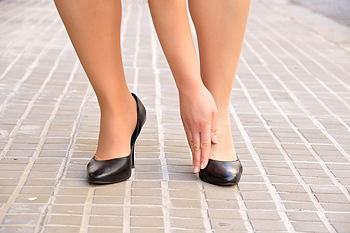Items filtered by date: October 2021
What Is Sever’s Disease?
 When children between the ages of 8 and 14 struggle with heel pain, it is often a result of Sever’s disease. This occurs when the bones in the calves grow slightly quicker than the Achilles tendon (which connects the calf muscles to the heel bone). When this happens, the tendon tightens and the bones in the heels become swollen and sore. As the child continues to grow, there is thankfully no long-term damage caused by Sever’s disease. Common signs of Sever’s disease include limping, tenderness in the heel, and swelling in the heel bone, particularly after running and jumping activities. Parents who believe that their child is suffering from Sever’s disease should consult with a podiatrist for a proper diagnosis and treatment.
When children between the ages of 8 and 14 struggle with heel pain, it is often a result of Sever’s disease. This occurs when the bones in the calves grow slightly quicker than the Achilles tendon (which connects the calf muscles to the heel bone). When this happens, the tendon tightens and the bones in the heels become swollen and sore. As the child continues to grow, there is thankfully no long-term damage caused by Sever’s disease. Common signs of Sever’s disease include limping, tenderness in the heel, and swelling in the heel bone, particularly after running and jumping activities. Parents who believe that their child is suffering from Sever’s disease should consult with a podiatrist for a proper diagnosis and treatment.
Sever's disease often occurs in children and teens. If your child is experiencing foot or ankle pain, see one of our podiatrists from Toms River Podiatrist . Our doctors can treat your child’s foot and ankle needs.
Sever’s Disease
Sever’s disease is also known as calcaneal apophysitis, which is a medical condition that causes heel pain I none or both feet. The disease is known to affect children between the ages of 8 and 14.
Sever’s disease occurs when part of the child’s heel known as the growth plate (calcaneal epiphysis) is attached to the Achilles tendon. This area can suffer injury when the muscles and tendons of the growing foot do not keep pace with bone growth. Therefore, the constant pain which one experiences at the back of the heel will make the child unable to put any weight on the heel. The child is then forced to walk on their toes.
Symptoms
Acute pain – Pain associated with Sever’s disease is usually felt in the heel when the child engages in physical activity such as walking, jumping and or running.
Highly active – Children who are very active are among the most susceptible in experiencing Sever’s disease, because of the stress and tension placed on their feet.
If you have any questions, please feel free to contact our office located in Toms River, NJ . We offer the newest diagnostic and treatment technologies for all your foot and ankle injuries.
What Is Heel Fat Pad Syndrome?
The heels of our feet are cushioned by fatty tissues that form a heel pad. This structure acts as a shock absorber, protecting our heel bones from injury. Acute or chronic trauma to the foot and aging can both wear away the heel pad, causing deep, bruise-like pain. People who are older or obese, and those who have rheumatoid arthritis or receive corticosteroid injections into the feet are at an increased risk of developing this condition. Treatment for heel fat pad syndrome is typically conservative and involves resting and icing the affected foot, wearing more comfortable shoes or orthotics, and taking non-steroidal anti-inflammatory drugs to reduce pain. If you are experiencing heel pain, it is suggested that you seek the care of a podiatrist.
Many people suffer from bouts of heel pain. For more information, contact one of our podiatrists of Toms River Podiatrist . Our doctors can provide the care you need to keep you pain-free and on your feet.
Causes of Heel Pain
Heel pain is often associated with plantar fasciitis. The plantar fascia is a band of tissues that extends along the bottom of the foot. A rip or tear in this ligament can cause inflammation of the tissue.
Achilles tendonitis is another cause of heel pain. Inflammation of the Achilles tendon will cause pain from fractures and muscle tearing. Lack of flexibility is also another symptom.
Heel spurs are another cause of pain. When the tissues of the plantar fascia undergo a great deal of stress, it can lead to ligament separation from the heel bone, causing heel spurs.
Why Might Heel Pain Occur?
- Wearing ill-fitting shoes
- Wearing non-supportive shoes
- Weight change
- Excessive running
Treatments
Heel pain should be treated as soon as possible for immediate results. Keeping your feet in a stress-free environment will help. If you suffer from Achilles tendonitis or plantar fasciitis, applying ice will reduce the swelling. Stretching before an exercise like running will help the muscles. Using all these tips will help make heel pain a condition of the past.
If you have any questions please contact our office located in Toms River, NJ . We offer the newest diagnostic and treatment technologies for all your foot and ankle needs.
Get Proper Care for a Sports-Related Foot or Ankle Injury This Fall
What to Avoid When It Comes to High Heels
High heeled shoes may be fashionable, but they are not your best footwear option when it comes to maintaining the proper health of your feet. Wearing high heels, particularly shoes that are tight-fitting, narrow, or have excessively high heels, can damage your feet. Frequent high heel wearing can lead to bunions, hammertoes, pump bump, corns, calluses, neuromas, ankle sprains, and even back pain. If you would still like to wear high heels, reduce the risk of potential problems by opting for shoes that do not have pointed or narrow toe boxes, or a heel taller than two inches. If you start to feel foot pain while wearing these shoes, it is suggested that you change into something more comfortable and properly fitting as soon as possible. For more information about the effects of high heels on the feet, please consult with a podiatrist.
High heels have a history of causing foot and ankle problems. If you have any concerns about your feet or ankles, contact one of our podiatrists from Toms River Podiatrist . Our doctors can provide the care you need to keep you pain-free and on your feet.
Effects of High Heels on the Feet
High heels are popular shoes among women because of their many styles and societal appeal. Despite this, high heels can still cause many health problems if worn too frequently.
Which Parts of My Body Will Be Affected by High Heels?
- Ankle Joints
- Achilles Tendon – May shorten and stiffen with prolonged wear
- Balls of the Feet
- Knees – Heels cause the knees to bend constantly, creating stress on them
- Back – They decrease the spine’s ability to absorb shock, which may lead to back pain. The vertebrae of the lower back may compress.
What Kinds of Foot Problems Can Develop from Wearing High Heels?
- Corns
- Calluses
- Hammertoe
- Bunions
- Morton’s Neuroma
- Plantar Fasciitis
How Can I Still Wear High Heels and Maintain Foot Health?
If you want to wear high heeled shoes, make sure that you are not wearing them every day, as this will help prevent long term physical problems. Try wearing thicker heels as opposed to stilettos to distribute weight more evenly across the feet. Always make sure you are wearing the proper shoes for the right occasion, such as sneakers for exercising. If you walk to work, try carrying your heels with you and changing into them once you arrive at work. Adding inserts to your heels can help cushion your feet and absorb shock. Full foot inserts or metatarsal pads are available.
If you have any questions please feel free to contact our office located in Toms River, NJ . We offer the newest diagnostic and treatment technologies for all your foot and ankle needs.


